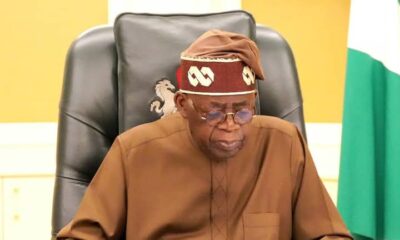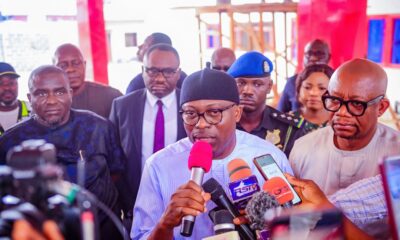Business
Nigerian Content: ‘FG’s 70% Target By 2010, Impossible’
Nelson Chukwudi
More than a decade after the Federal Government began the process to ensure that the strategic oil and gas industry achieves 70 per cent Nigerian content in all aspects of its operations by 2010, the major beneficiaries of the policy have said the set target is absolutely not feasible.
President of Petroleum Technology Association of Nigeria (PETAN), Engr. Shawley Coker, told The Tide in an exclusive interview last Tuesday, that the “Federal Government’s target of 70 per cent Nigerian content in the oil and gas business by 2010 is absolutely impossible to achieve”.
However, the leading oil and gas exploration and production companies led by Shell and the Nigerian National Petroleum Corporation (NNPC), represented by the National Petroleum Investment Management Services (NAPIMS), had Monday, assured they would do everything to comply with the federal government directives on Nigerian content development and the achievement of the 70 per cent target by 2010.
With membership of more than 40, PETAN is the umbrella body of leading indigenous technical oilfield service companies in the upstream and downstream sectors of the oil and gas industry, whose vision is the domestication of petroleum technology in Nigeria, and an arm of the very influential Oil Producers Trade Section (OPTS) of the Nigerian Chamber of Commerce, Industry, Mines and Agriculture (NCCIMA).
Coker spoke in the backdrop of the first-ever Nigerian Content Development Day/Exhibition, hosted by Shell Petroleum Development Company of Nigeria in Port Harcourt, last Monday, which he described as a very significant milestone in the effort to facilitate the development of Nigerian content in the oil and gas business.
The PETAN president praised the doggedness and resilience of most indigenous entrepreneurs in the oil and gas sector, who he said, “are doing their best to make an impact in the industry, even as they face the turbulent and gloomy business climate in the country,” stressing that most of the indigenous service companies were only struggling to remain in business because the conditions in the country have failed to encourage local investors in the industry.
According to him, “the federal government is making mockery of the whole idea of Nigerian content. Why are they always in a hurry to set targets they know are not feasible? For the policy to achieve its goals, the government has to create the enabling environment for local industries to thrive. Until they muster the political will to take actions in the interest of the ordinary Nigerian, the 70 per cent Nigerian content target will remain a mirage.”
Coker noted that “the overall NCD goal is good and well-intentioned,” but insisted that the conditions on the ground, accentuated by “official corruption and lack of political will”, have made the government’s policy on NCD a mere mockery of Nigerian people’s desires for speedy industrialisation and economic development.
The PET AN boss regretted that most economic policies of the government were articulated and formulated by officials, whose innate interests are to frustrate emerging local entrepreneurs, bolster their political and economic influence, thereby stagnating the growth of majority of indigenous businesses.
He drew attention to the worrisome state of the steel and the wobbling manufacturing sectors, the epileptic power supply situation, which has inflicted huge losses on investors, the comatose and sorry state of infrastructures, particularly roads, and a litany of legislation working against the growth of the economy, as areas the government has failed to address, adding that except all the enabling structures are put in place, sound policy frameworks were bound to fail.
The industrialist, who has huge investments in the upstream and downstream sectors of the oil and gas industry in Nigeria, regretted that “most Nigerian investors in the oil and
Business
Tinubu’s RHI Doles Out N50m To 1,000 Kwara Petty Traders

Business
UBA To Educate SMEs, Business Owners On Withholding Tax

Business
Nigeria Losing $40b Annually From Maritime Sector – NIMENA
-
Business4 days ago
FG Seeks partnership With World Economic Forum On Gas Pipeline Project
-
Business2 days ago
Data Privacy Ecosystem Can Drive Trillion Dollar Economy – NDPC
-
Rivers1 day ago
PHCCIMA Breaks Down Rivers 2025 Budget
-
Rivers4 days ago
Kirike Chiefs Endorse Ogube’s leadership … As Chairman Sues For Unity
-
Politics2 days ago
Diri Emerges South-South Governors Forum Chairman As Forum Gives Nod To FG’s Tax Reform Initiative
-
Business1 day ago
NUPRC Targets N15tn Revenue In 2025
-

 Featured4 days ago
Featured4 days agoFG Begins Recruitment Into Federal Civil Service
-

 News1 day ago
News1 day agoFubara Lauds Tinubu For Setting Up Education Load Fund … Vows To Ensure Rivers Benefit Maximally From Scheme

